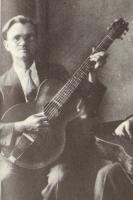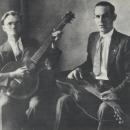Working in a weave-room, fighting for my life
Trying to make a living for my kiddies and my wife;
Some are needing clothing, some are needing shoes,
But I'm getting nothing but the weave-room blues.
I've got the blues, I've got the blues,
I've got them awful weave-room blues;
I got the blues, the weave-room blues.
With your looms a-slamming, shuttles bouncing in the floor,
When you flag your fixer, you can see that he is sore;
Trying to make a living, but I'm thinking I will lose,
For I'm sent a-dying with them weave-room blues.
I've got the blues, I've got the blues,
I've got them awful weave-room blues;
I got the blues, the weave-room blues.
Harness eyes are breaking with the doubles coming through,
Devil's in your alley and he's coming after you,
Our hearts are aching, well, let's take a little booze;
For we're simply dying with them weave-room blues.
I've got the blues, got the blues,
I've got them awful weave-room blues;
I got the blues, the weave-room blues.
Slam-outs, break-outs, knot-ups by the score,
Cloth all rolled back and piled up in the floor;
The harness eyes are breaking, strings are hanging to your shoes,
We're simply dying with them weave-room blues.
I've got the blues, got the blues,
I've got them awful weave-room blues;
I got the blues, the weave-room blues.
Trying to make a living for my kiddies and my wife;
Some are needing clothing, some are needing shoes,
But I'm getting nothing but the weave-room blues.
I've got the blues, I've got the blues,
I've got them awful weave-room blues;
I got the blues, the weave-room blues.
With your looms a-slamming, shuttles bouncing in the floor,
When you flag your fixer, you can see that he is sore;
Trying to make a living, but I'm thinking I will lose,
For I'm sent a-dying with them weave-room blues.
I've got the blues, I've got the blues,
I've got them awful weave-room blues;
I got the blues, the weave-room blues.
Harness eyes are breaking with the doubles coming through,
Devil's in your alley and he's coming after you,
Our hearts are aching, well, let's take a little booze;
For we're simply dying with them weave-room blues.
I've got the blues, got the blues,
I've got them awful weave-room blues;
I got the blues, the weave-room blues.
Slam-outs, break-outs, knot-ups by the score,
Cloth all rolled back and piled up in the floor;
The harness eyes are breaking, strings are hanging to your shoes,
We're simply dying with them weave-room blues.
I've got the blues, got the blues,
I've got them awful weave-room blues;
I got the blues, the weave-room blues.
inviata da Dead End - 31/8/2012 - 11:16
×
![]()








Testo trovato su Folk Archive
“Ho la tristezza, la malattia della fabblica tessile… Stamo tutti semplicemente morendo di questa tristezza, di questa malattia…”
The "Weave Room Blues," perhaps his most significant industrial composition, was written in 1932, and was what he [Dorsey Dixon] called his first blues....
The song became a standard during the trade union drive in the Richmond County mills in the early '30s -- a drive which the Dixons wholeheartedly supported.
The "Weave Room Blues" and Dorsey's later industrial songs well express the dissatisfaction of those mountaineers who had swapped the plough for the loom and were now entangled in the fluctuating fortunes of the textile industry. Understandably, these workers, once used to supporting themselves, albeit meagrely, were now dependent for their livelihood on the "company" and had little chance of returning to the land.
(Mike Paris, "The Dixons of South Carolina," Old Time Music 10, Autumn 1973, London, GB, p. 13.)
*
Il “Blues della fabbrica tessile” è forse la più importante canzone composta da Dixon, il suo primo blues. Divenne un classico durante le proteste sindacali nella contea di Richmond, North Carolina, negli anni 30, manifestazioni cui Dixon partecipò in prima persona.
Il “Blues della fabbrica tessile” e le altre canzoni di Dixon dedicate al lavoro in fabbrica esprimono con chiarezza la frustrazione dei contadini strappati alle loro montagne, ai loro campi ed aratri e gettati a lavorare nei rumorosi ed insani capannoni che ospitavano batterie di grandi telai meccanici a perdita d’occhio. Questi lavoratori e le loro famiglie, che prima riuscivano ad essere autosufficienti, ora dipendevano totalmente dalla compagnia, dai padroni, ed avevano poca speranza di poter rivedere in vita la propria terra d’origine.